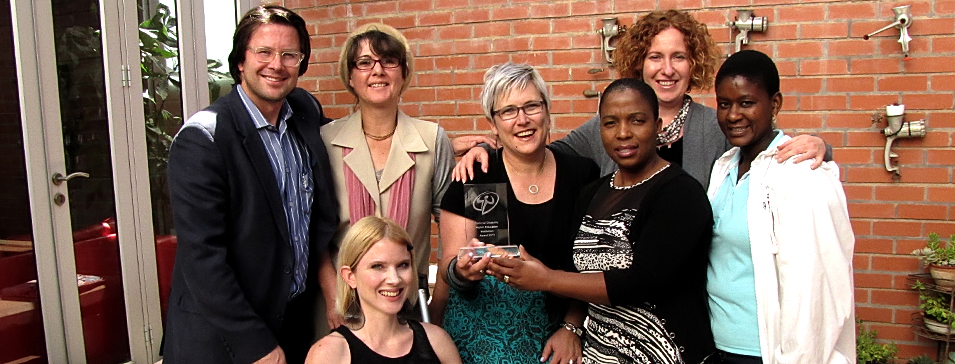Latest News Archive
Please select Category, Year, and then Month to display items
02 January 2025
|
Story Gerda-Marie van Rooyen
|
Photo Supplied
 Leading the research in South Africa is Prof Linus Franke from the Department of Soil, Crop and Climate Sciences.
Leading the research in South Africa is Prof Linus Franke from the Department of Soil, Crop and Climate Sciences.
Scientists are actively pursuing the successful breeding of diploid hybrid potatoes from inbred lines. This is expected to revolutionise potato breeding as it holds the key to rapid genetic progress. It will introduce new varieties for commercialisation through seed. Currently, existing potato variants have a gene that renders self-pollinated seeds infertile.
Prof Linus Franke, an academic in the Department of Soil, Crop and Climate Sciences at the UFS, is leading the research in South Africa. “This technology allows the production of genetically uniform potato seed that is easy to transport and largely disease-free.” He says this differs from conventional breeding whereby only vegetative propagation is possible due to tetraploid varieties in potatoes. It also risks carrying pests and diseases from one generation to the next – leading to the accumulation of pests and diseases with each round of multiplication.
Seed innovation
Prof Franke explains that Solynta BV, a seed company based in the Netherlands that produces potato varieties that can be grown from seed, has included South Africa in their research efforts because it is one of Africa’s largest producers and exporters. Through his academic relationship with Wageningen University and Research, a Dutch institution renowned for its agricultural endeavours and food production, the UFS became involved in researching hybrid potatoes grown from seed.
Diploid seeds containing two sets of chromosomes allow easier gene manipulation to increase predictability and speedier genetic progress. The breeding approach enables the incorporation of tolerance to pests, diseases, abiotic stresses (cold, heat, drought) and other desired genetic traits.
Although Prof Franke is optimistic about this research, he is not blind to disadvantages. “Potato seeds are tiny and have little energy reserves, making it harder to grow potatoes from seed than from tubers.” He says potatoes from seed will take longer to cultivate than tubers, as farmers need to grow plantlets from seeds first, adding six weeks to the growing period. “It is possible that commercial farmers can grow potatoes directly from seed. Alternatively, perhaps more likely, specialised growers will produce tubers of potatoes from seed; these tubers are then sold as seed tubers to other potato farmers, who then continue their normal practices of producing potatoes for the market from tubers.”
Financial benefits
Prof Franke says farmers have reason to get excited. “Seed potatoes will reduce input costs, as varieties with enhanced tolerance to pests and diseases require less pesticides. Planting one hectare of potatoes requires three to four tonnes of potato tubers, but only one 25 g packet of potato seeds.” Since potatoes are a more valuable commodity than maize, this technology might also increase farmers’ income potential.
University recognised as leading Higher Education Institution for students with disabilities
2013-12-05
 |
The University of the Free State has been lauded for creating an inclusive environment for persons with disabilities, winning the 2013 National Disability Higher Education Institution Award. The award was presented at the National Disabilities Awards held in Port Elizabeth as part of the celebrations for International Day of People with Disabilities.
The Deputy Minister for Women, Children and People with Disabilities, Hendrietta Ipeleng Bogopane-Zulu, commended the university during the event for standing out among South African institutes of higher education. She told the audience the award gives recognition to institutions that demonstrate, through their strategy and policy, the provision of an inclusive environment for persons with disabilities. This is done through the use of technology and accessibility at their premises.
It's not the first time the university received praise from the deputy minister. In 2012 she visited the Bloemfontein Campus as part of a nation-wide roadshow to assess disability compliance and support services at all universities and FET colleges. Impressed with the work of the Unit for Students with Disabilities (USD), she recommended that staff from various higher education institutions visit the campus to gain insight into what they are doing.
Receiving the award on behalf of the university, Hetsie Veitch, Director of the USD, says the award recognises the commitment of the university’s senior leadership, who support the USD in creating a learning environment that is welcoming and accessible to all students.
Rudi Buys, Dean of Student Affairs, says the university is appreciative of what the USD does and says the award is a great achievement for a unit that only started functioning on its own three years ago. “The role of our support unit for Students with Disabilities has since 2010 grown to hold not only a prominent place in our institutional reflection on and implementation of approaches of universal access, but also to stand as leading department in building and bearing witness to the commitment of the UFS to values of universal access.”